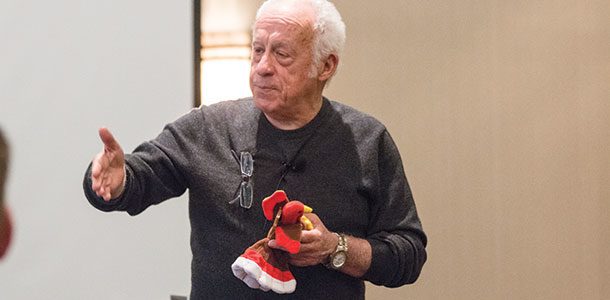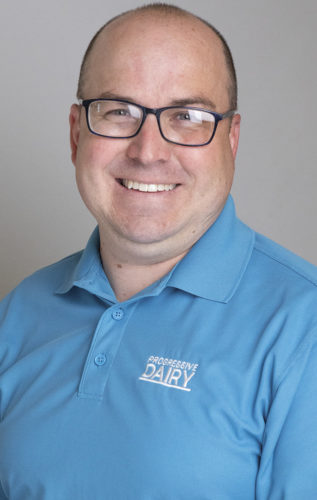Dairy owners and managers from around the country learned how to improve their hiring practices and build better teams at the most recent PDPW Managers Academy held in Charlotte, North Carolina. More than 80 dairy professionals from 17 states participated in the three-day training.
‘Hire tough, manage easy’
Recruiter and hiring expert Mel Kleiman, president of Humetrics, instructed attendees how to find and screen hourly employee applicants for their dairy businesses. He encouraged participants to use his suggestions to avoid hiring “turkeys” and instead find and retain great employees, or “eagles” as he called them.
He sympathized with the dairy managers, saying that few if any of them were likely ever trained in how to do employment interviews. But he emphasized that it’s an important skill in today’s job market.
“All the turkeys have learned to dress up like eagles,” Kleiman said. “And eagles don’t always dress up like eagles.”
He offered a few suggestions for interview questions to ask when screening applicants. Every part of the screening process, including the interview, should be a test.
For example, he said dairies who are looking for employees who are going to be safe on the job could ask the following question: What percentage of time do you wear a seat belt? If the employee doesn’t answer 100 percent of the time, you might be able to determine that safety isn’t a habit the employee has developed.
He also suggested talking about the employee’s first job, not their last one.
“You want to watch the movie from the beginning, not backwards,” Kleiman said.
Potential “eagle” employees will show growth in responsibility and accountability from one job to the next, he said. Ask potential employees to tell you three things they learned from their first job. If the employee says their first job was a milker and their next job was as a milker and they are applying to be a milker, they will likely only ever be a milker.
Kleiman suggested that if being on time is a key skill you’re looking for in a milker, hold the interview at the time you need the employee to show up for work, even if that’s at 4:30 a.m. or 8 p.m.
If the employee is already working another job at one of those times, tell them you want to meet with them at one of those hours on their day off. Kleiman suggested this helps employers to stay in control of the interview and hiring process.
To address how good of a milker they might be, Kleiman suggested asking them to rate themselves as a milker on a scale of 1 to 10. Ask them why they gave themselves that score. If they give you a number less than 10, ask a follow-up question, he suggested.
“What would it take for you to move from being a 7 to an 8?” This, he said, will help you understand if the employee is humble or self-aware of their own areas for improvement (a positive trait). Even if they are self-aware, it could also shed light on just how much they know about the skills required of the job they are applying for.
How to recruit
Kleiman said that most great employees are already working, so if you’re looking for a great new hire from a classified ad, you’re looking only in the pool of applicants who are not employed.
He challenged attendees to raise their expectations for potential hires and seek good employees who are currently employed but may be looking for better jobs. Many great employees who are currently working would consider a change if presented one.
“Recruiting is like bathing. You need to do it every day,” Kleiman said.
He suggested dairies request referrals from their best current employees. However, he cautioned that when you get referrals, ask if the employee would recommend the referral. He said these are two good follow-up questions to ask of those referring others: Do you want to work with them? Why would they make a good employee?
Several attendees expressed concerns that requesting referrals could lead to poaching from other dairies. They recognized many good employees may be working on a dairy in the area, but hiring them could cause tension between farms and have other negative, retaliatory consequences (i.e., denied access to farmland, higher land rents, etc.).
Kleiman said those risks need to be weighed carefully on a case-by-case basis. A few attendees said they have had employees from other dairies approach them about switching employment. In those instances in which they were comfortable, they approached the employee’s current employer and told them about the employee’s interest in changing employment, as a courtesy, before offering the employee a job.
Focus on retention
Kleiman strongly encouraged the dairy managers to make their dairies places where employees want to work. Retention is a self-reflection on the dairy manager as much as anything. Surveys show employees, in general, leave managers more often than they leave jobs. Kleiman said if retention increases, it decreases the number of recruits you need.
He suggested retention begins on the first day of the job. Managers should meet with new employees before their first hour on the job and describe expectations, then meet with them again at the end of the first day to ask how things went and if they have any questions.
Meet with them again at the end of the first week to see again if they have any questions. He suggested personally delivering their first paycheck. This might be the opportunity to let them know if they are meeting expectations or what areas they could still improve in. He also recommends acknowledging them on the date of their first anniversary of hiring.
Kleiman said these first meetings are a good time to figure out how the employee likes to receive recognition. He suggested you know each employee’s favorite candy bar, soda pop and free-time activity. Later, you can reward employees with these simple gifts that already mean a lot to them.
He also suggested you find out which of four things most motivates an employee among money, recognition, interesting work and work-life balance. A candy bar gift might mean as much to one employee as an hour off to attend a wedding or family activity to another employee.
“If you hire a turkey, train a turkey and motivate a turkey, all you end up with is a trained, motivated turkey.” Kleiman said. PD
PHOTO
Recruiter and hiring expert Mel Kleiman, president of Humetrics, encouraged attendees to use his suggestions to avoid hiring “turkeys” and instead find and retain great employees, or “eagles” as he called them. Photo by PD staff.

Walt Cooley
Editor
Progressive Dairyman







